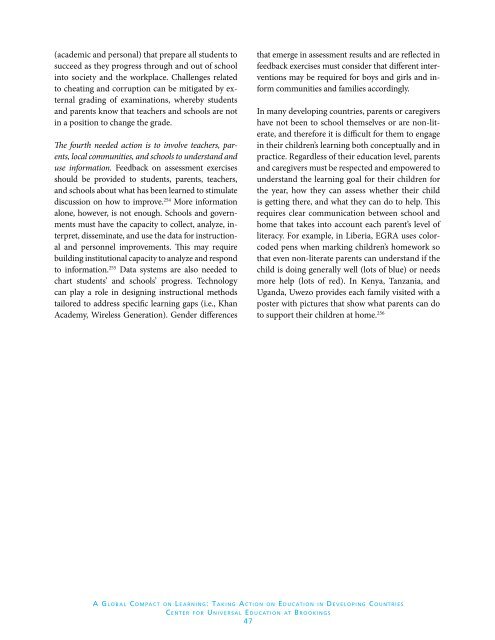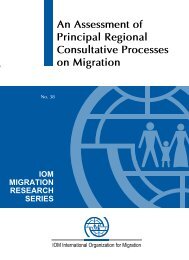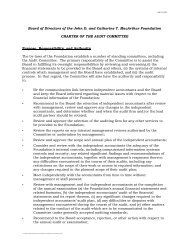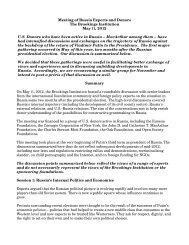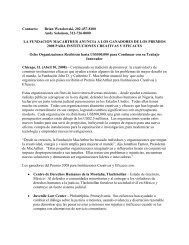A Global Compact on Learning - Brookings Institution
A Global Compact on Learning - Brookings Institution
A Global Compact on Learning - Brookings Institution
You also want an ePaper? Increase the reach of your titles
YUMPU automatically turns print PDFs into web optimized ePapers that Google loves.
(academic and pers<strong>on</strong>al) that prepare all students to<br />
succeed as they progress through and out of school<br />
into society and the workplace. Challenges related<br />
to cheating and corrupti<strong>on</strong> can be mitigated by external<br />
grading of examinati<strong>on</strong>s, whereby students<br />
and parents know that teachers and schools are not<br />
in a positi<strong>on</strong> to change the grade.<br />
The fourth needed acti<strong>on</strong> is to involve teachers, parents,<br />
local communities, and schools to understand and<br />
use informati<strong>on</strong>. Feedback <strong>on</strong> assessment exercises<br />
should be provided to students, parents, teachers,<br />
and schools about what has been learned to stimulate<br />
discussi<strong>on</strong> <strong>on</strong> how to improve. 254 More informati<strong>on</strong><br />
al<strong>on</strong>e, however, is not enough. Schools and governments<br />
must have the capacity to collect, analyze, interpret,<br />
disseminate, and use the data for instructi<strong>on</strong>al<br />
and pers<strong>on</strong>nel improvements. This may require<br />
building instituti<strong>on</strong>al capacity to analyze and resp<strong>on</strong>d<br />
to informati<strong>on</strong>. 255 Data systems are also needed to<br />
chart students’ and schools’ progress. Technology<br />
can play a role in designing instructi<strong>on</strong>al methods<br />
tailored to address specific learning gaps (i.e., Khan<br />
Academy, Wireless Generati<strong>on</strong>). Gender differences<br />
that emerge in assessment results and are reflected in<br />
feedback exercises must c<strong>on</strong>sider that different interventi<strong>on</strong>s<br />
may be required for boys and girls and inform<br />
communities and families accordingly.<br />
In many developing countries, parents or caregivers<br />
have not been to school themselves or are n<strong>on</strong>-literate,<br />
and therefore it is difficult for them to engage<br />
in their children’s learning both c<strong>on</strong>ceptually and in<br />
practice. Regardless of their educati<strong>on</strong> level, parents<br />
and caregivers must be respected and empowered to<br />
understand the learning goal for their children for<br />
the year, how they can assess whether their child<br />
is getting there, and what they can do to help. This<br />
requires clear communicati<strong>on</strong> between school and<br />
home that takes into account each parent’s level of<br />
literacy. For example, in Liberia, EGRA uses colorcoded<br />
pens when marking children’s homework so<br />
that even n<strong>on</strong>-literate parents can understand if the<br />
child is doing generally well (lots of blue) or needs<br />
more help (lots of red). In Kenya, Tanzania, and<br />
Uganda, Uwezo provides each family visited with a<br />
poster with pictures that show what parents can do<br />
to support their children at home. 256<br />
A <str<strong>on</strong>g>Global</str<strong>on</strong>g> Compa c t <strong>on</strong> <strong>Learning</strong>: Taking Acti<strong>on</strong> <strong>on</strong> Educat i o n in Developing Countries<br />
C e n t e r for Universal Educat i o n at <strong>Brookings</strong><br />
47


